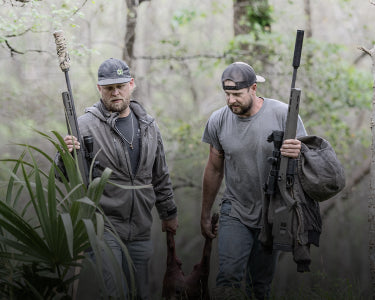
A secluded cabin in the woods, no cell phone service, unfamiliar, rugged landscape, bad weather…it sounds like the synopsis of a typical horror movie, or at least the recipe for disaster… and it too often is. Hundreds of hunters get lost every year for these exact reasons. And though a machete-wielding undead psychopath should be the least of your worries, getting lost in the woods is a scary situation.
Why and How Hunters Get Lost
Some of the best hunting occurs right after sunrise and right before sunset, which means you might trail deep into the night and it will most likely be dark by the time you make it back to camp. Because it’s easy to lose your way when there are no clear paths or obvious landmarks on land you don’t often walk, there is a chance you could get lost. It happens to even the most experienced hunters.
Most lost hunters are rescued within 24 hours. However, that still means spending a night in the woods. With the right gear packed and the right mindset, you should do just fine a couple of nights lost in the wilderness. Early-season hunter Cory Krambule was separated from his hunting party when a snowstorm made it nearly impossible to see. He spent the night in the blizzard and was rescued the next morning. About his experience, Cory says, “Don’t assume anything, take your gear, even if it’s a little bit heavier, even if you think you’re only going to be gone 15 minutes.” (Fox 13 Salt Lake City News)
Though hard statistics are difficult to find on exactly how many hunters each year get lost, we do know that in National Parks, an average of 11 people are reported lost per day. So, don’t feel foolish if it happens to you. Just know what to do—and what to bring—if it does…
How to Avoid Getting Lost While Hunting
Though mistakes and accidents are inevitable, you can better prepare and plan before heading afield to avoid getting lost in the first place.
Always follow the golden rules of wilderness survival:
- Tell someone where you are going and when to expect you back.
- Scout your hunting grounds beforehand during the day and take note of trails and landmarks and drop waypoints on your GPS unit.
- Carry a topo map, compass, a GPS and a fully charged cell phone. The Maine Department of Inland Fisheries and Wildlife suggests, “Before entering the woods—whether at an old logging road, a town or country road, or from camp itself—you should check your compass and bearings… determine the general direction or course which you must follow to return to the road.”
- Use trail markers from camp to your stand and when blood tracking.
- When you discover you’re lost, S.T.O.P.—stop, think, observe and plan. Search and Rescue says to stay in place—the chances of finding you are greater if you sit tight.
- Pack the right survival gear for a night spent out in less-than-ideal conditions.
What to Bring When You Get Lost While Hunting: 15 Survival Essentials

-
Appropriate clothing.
Whichever season it is, it’s highly likely to get cold, if not downright freezing, when the sun goes down. Always pack a wool beanie, gloves, moisture-wicking base layers, and waterproof outerwear. -
Signaling device.
Carry a mirror, whistle, or even flares. Alternatively, three evenly spaced gunshots are universally recognized as a distress signal. -
Compass, GPS unit and charged cell phone.
Learn how to use a topo map and bring one. GPS is great, but batteries die—maps and compasses don’t. -
Long-range walkie talkies.
These can be lifesavers when hunting with a buddy. Check in periodically, especially after sunset. -
Extra batteries.
Bring spares for your GPS, flashlight, radio, and any optics or thermal units you’re carrying. -
Flashlight or headlamp.
Compact and powerful LED flashlights or hands-free headlamps are essential in low light. Don’t rely on just one. -
Fire starter and tinder.
Pack multiple options: magnesium fire rod, windproof lighter, waterproof matches, and pre-packed tinder or cotton balls soaked in petroleum jelly. -
Survival knife or multi-tool.
Versatile and indispensable for cutting branches, building shelter, cleaning game, or basic defense. -
First aid kit.
Include bandages, antiseptic wipes, insect repellent, pain relievers, and clotting agents like QuikClot. -
Mylar blanket or winter-rated sleeping bag.
Staying dry is crucial. Hypothermia can set in fast. Add a tarp and rope for improvised shelter. -
Water and water filter straw.
Dehydration happens faster than you think. Always carry clean water and a filtration device. -
High-energy snacks.
Protein bars, jerky, trail mix, and MREs can keep you fueled and alert through the night. -
Chemical hand and feet warmers.
Lightweight, disposable heat sources that can make a huge difference in comfort and morale. -
Trail marker tape and hunter orange.
Mark your trail or signal searchers. A bright vest can double as a flag in open areas. -
Prescription medication.
Don’t forget any daily meds or life-saving emergency prescriptions like insulin or an EpiPen.
Lessons from Real Lost Hunter Survival Stories
No one ventures out expecting to get lost, but survival stories show that it’s rarely one major error—it’s usually a series of small, preventable mistakes. Overconfidence, under-preparation, and bad luck form a deadly triangle. Canadian hunter Brad Lambert survived 23 days lost in the wilderness. His lesson? Never hunt unprepared.
Brad says, “I don’t plan to hunt alone again. I think about it differently now. I’ll hunt only in familiar woods, and I intend to buy a satellite phone. And I’ll always carry extra fuel and food from now on.”
Prepare Now So You Don't Panic Later
Getting lost while hunting can happen to anyone—newbies and veterans alike. The key isn’t avoiding the woods, it’s venturing in with the right preparation, gear, and mindset. Make your survival kit a part of your hunting pack and never assume “I’ll just be gone a few minutes.”



